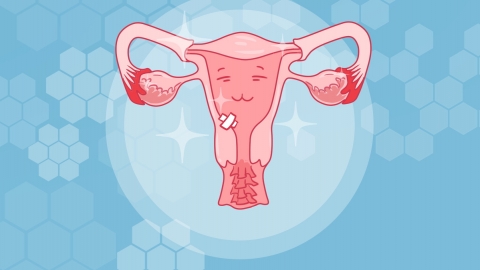What causes a thickened endometrium?
Generally, thickened endometrium may be caused by hormonal fluctuations, aging, endometrial hyperplasia, polycystic ovary syndrome (PCOS), endometrial cancer, and other factors. If discomfort occurs, timely medical consultation is recommended. Detailed explanations are as follows:
1. Hormonal Fluctuations
Estrogen is the primary hormone that promotes endometrial proliferation. A temporary increase in estrogen levels or relatively insufficient progesterone can lead to excessive thickening of the endometrium, commonly seen during the proliferative phase of the menstrual cycle, often accompanied by menstrual irregularities. Maintain a regular sleep schedule and avoid staying up late, as this may affect hormonal secretion rhythms. Eat a balanced diet, reduce intake of estrogen-rich foods, and consume more fresh fruits, vegetables, and high-quality proteins. Learn to manage emotions, avoid prolonged anxiety and stress, and stabilize the endocrine system through meditation, walking, and other methods.
2. Aging
Perimenopausal women experience gradual ovarian function decline, leading to hormonal imbalances and unstable estrogen levels, making endometrial thickening more likely. This may be accompanied by symptoms such as prolonged menstrual bleeding. Regular gynecological ultrasound examinations are recommended every six months to one year to monitor changes in endometrial thickness. Maintain a healthy lifestyle, engage in appropriate physical activity to enhance physical fitness, and control weight to avoid obesity. If menstrual abnormalities occur, seek timely medical evaluation to determine the cause of endometrial thickening.

3. Endometrial Hyperplasia
Long-term estrogen stimulation causes endometrial hyperplasia, characterized by endometrial thickening, which can be classified as simple or complex hyperplasia, often accompanied by symptoms such as increased menstrual flow and prolonged menstruation. Under medical guidance, progestin medications such as dydrogesterone tablets, progesterone soft capsules, and medroxyprogesterone acetate tablets may be used to inhibit endometrial hyperplasia. Regular ultrasound and endometrial biopsies should be conducted during treatment to monitor therapeutic effects. If drug treatment is ineffective, diagnostic curettage may be considered under medical advice, which can both confirm the diagnosis and provide hemostatic and therapeutic effects.
Patients with polycystic ovary syndrome (PCOS) often experience ovulation disorders and insufficient progesterone secretion, with continuous estrogen stimulation leading to endometrial thickening. Symptoms may include oligomenorrhea, hirsutism, acne, and others. Under medical supervision, hormonal-regulating medications such as ethinyl estradiol cyproterone tablets, dydrogesterone tablets, and spironolactone tablets may be used to improve ovulation and hormone levels. Control dietary intake, reduce consumption of high-sugar and high-fat foods, and increase dietary fiber and protein intake. Engage in regular physical activity, lose weight, and improve insulin resistance and hormonal imbalances.
5. Endometrial Cancer
In patients with endometrial cancer, abnormal proliferation of cancer cells can significantly thicken the endometrium, often accompanied by irregular vaginal bleeding and abnormal discharge. Once suspected, prompt medical consultation is necessary for diagnostic curettage or hysteroscopy to confirm the pathological diagnosis. After diagnosis, treatment should be conducted under medical guidance. Early-stage disease may be treated surgically, and postoperative management may include adjuvant drug therapy such as megestrol acetate dispersible tablets, hydroxyprogesterone caproate injection, and tamoxifen tablets. Regular follow-up examinations should be conducted during treatment to monitor disease progression, and a positive mindset should be maintained to support therapy.
In daily life, attention should be paid to menstrual hygiene and strenuous activities during menstruation should be avoided. Regular gynecological check-ups are important, especially for women with menstrual irregularities or high-risk factors. If abnormal vaginal bleeding or foul-smelling discharge occurs, immediate medical attention is necessary.









